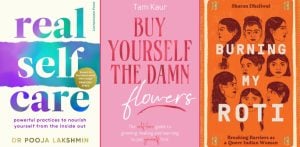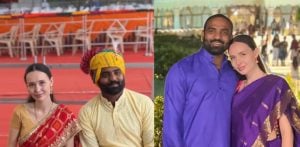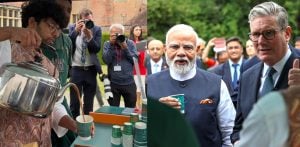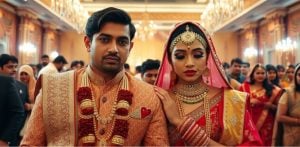"the best part was the freedom."
Shaadi-themed parties are becoming Gen Z’s latest excuse to dress up, dance hard, and celebrate, without the wedding.
This new trend mimics the energy of a big fat Indian shaadi, but no one’s actually getting married.
Instead, it’s all about the vibe: kaleere, dhols, lehengas, and late-night baraat-style dancing with zero pressure or protocol.
What began as a quirky novelty is fast turning into a full-blown movement across cities, campuses, and clubs across South Asia and the world.
Shaadis are even becoming the theme for events like birthday parties.
With no traditions to follow and no families to please, Gen Z is rewriting what celebration looks like, one fake sangeet at a time.
Shaadi-Style Without the Stress

At the heart of this trend lies a simple truth: everyone loves weddings, but not necessarily the expectations that come with them.
Enter the “fake sangeet”, a party that looks and feels like a wedding function, but is purely performative.
Ayaan Vaid, co-founder of event company Jumma, recently organised one such event.
He said: “I’d been going to events and concerts my entire life and always felt this was something I’d really excel in.
“The idea for a fake sangeet came during the planning of a three-day wedding-themed event.
“Everyone loves weddings, dressing up, and Bollywood music, so I knew it would work.”
And it worked. With marigold garlands, mehndi artists, photo booths and live dhols, Jumma’s event recreated every detail of a traditional celebration.
Guests paid anywhere from Rs. 500 to Rs. 3,000 for the experience, proof that the demand is real and growing.
From Clubs to Campus

Nightlife venues were quick to jump on the bandwagon.
Lords of Drinks, a popular bar in Madhya Pradesh, transformed their space into a Desi wonderland for their fake sangeet night.
The club’s Instagram post made the theme crystal clear:
“The dress code read loud and clear. Desi fits only. No excuses. Just extra.”
For attendees like Bhavana Nawani, the appeal was obvious, saying:
“Everyone looked like they were actually at a cousin’s wedding. But the best part was the freedom. No drama, no pressure.
“Just friends dancing to Bollywood hits like it was the baraat of the year.”
But this phenomenon isn’t just confined to South Asia’s nightlife.
At Cornell University in the United States, the South Asian Council hosted Mock Shaadi, a two-day celebration complete with haldi, mehndi and pheras.
Praful Das, a Master’s student from India, described the event’s emotional impact. He said:
“As an international student, it felt like a heartwarming reminder of home.
“There was a bride and groom reveal, a full wedding procession, and even joota chupai. It blended culture and humour beautifully.”
Reclaiming Rituals for Fun

Shaadi-themed parties often blur the line between satire and sincerity.
In some cases, wedding-themed parties are even used as backdrops for self-love and identity expression.
Tvisha Gulati recalled attending a birthday party unlike any other.
She explained: “Everyone showed up in iconic ethnic fits. There was a kaleere moment, dancing like true baaratis, and a dramatic entry to cut the cake.”
The “groom” in question? Her friend Anmol, who married himself in a celebration of self-love.
Tvisha added: “The vidai was him passing out on his bed. It was probably the most fun I’d ever had.”
Whether it’s a mock wedding to celebrate friendship or a solo ceremony to embrace self-worth, the trend has unlocked new ways for young people to connect with their culture on their own terms.
A Cultural Remix

While Desi weddings have always been opulent, they’re also notoriously intense. Social obligations, family politics, and sky-high budgets often cast a shadow over the joy.
This new wave of shaadi-themed parties flips the script.
By removing the pressures of marriage and commitment, fake shaadis let participants fully enjoy the aesthetics, music and emotional highs of a wedding, without any of the real-world baggage.
The trend also reflects a deeper shift in how Gen Z relates to tradition.
Instead of rejecting cultural norms, many are remixing them. With humour, irreverence and plenty of sparkle, they’re making heritage fun again.
In a post-pandemic world where connection and celebration feel more important than ever, the rise of mock weddings makes perfect sense.
They are affordable, inclusive and completely customisable.
Whether it’s for nostalgia, content or catharsis, this trend is here to stay.
As long as there’s Bollywood music to dance to and kaleere to twirl, the baraat will go on, even if there’s no actual bride or groom waiting at the mandap.






























































